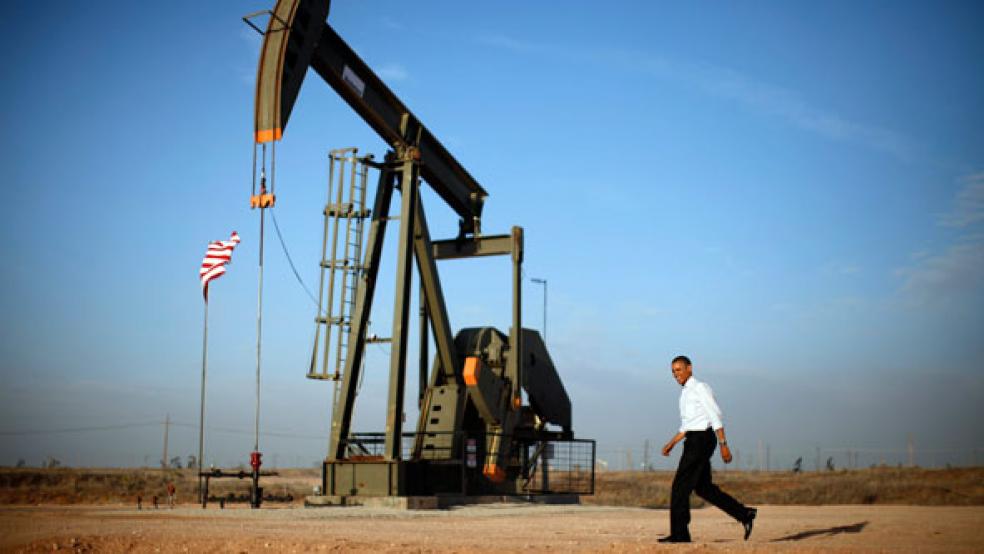Under Obama's request to Congress, the Commodity Futures Trading Commission (CFTC) would determine how much speculators need to pay to trade U.S. crude oil futures, in theory increasing the amount when prices move too far, too fast. But economists and traders cautioned that pushing smaller investors out of markets would only hand greater influence to the largest hedge funds and Wall Street banks. Ultimately, there may not be enough traders left to do business with oil producers and consumers looking to hedge their needs.
"Reduced liquidity often means greater volatility," said broker Jay Levine at Enerjay LLC in Maine. "That's the exact opposite of (Obama's plan's) purpose."
RELATED: Obama Goes Mano-a-Mano with Oil Speculators
Exchange-operator CME Group, which currently sets margin requirements for the benchmark U.S. crude oil contract, on Tuesday called the president's plan "misplaced," and said speculation should not be confused market manipulation. CME charges separate margin rates for speculators and end-users of oil such as airlines, who are hedging their physical needs.
One contract of benchmark U.S. crude, commonly known as West Texas Intermediate or WTI, had a notional value of just under $103,000 on Thursday, based on a standard 1,000 barrel contract and prices around $102.50 a barrel. Traders defined as speculators can buy that contract for an upfront cost of just $6,855, with a maintenance margin of $5,500. Those defined as hedgers would pay $5,100 upfront with a maintenance margin also of $5,100.
EXISTING POWERS
While Obama's bill currently has little hope of making it through a divided Congress, a price spike before November could boost cross-party support from politicians wary of siding with oil traders in an election year.
Two large waves of speculators have surged into oil markets in the last 14 months due to the supply disruption in Libya and plans for increased sanctions on Iran's oil exports this year. Prices rose on both moves, but some industry experts believe prices could have risen even more without their influence. "The attack on speculation is an attack on better functioning markets," said Edward Morse, global head of commodities research at Citigroup. "If there were not liquidity in the futures market... the chances are overwhelming that price volatility would be greater."
The CFTC already has emergency powers to raise margins, though they have rarely exercised them. Last year, when the supply shock in Libya was big enough to spark a coordinated stockpile release by the International Energy Agency, the CFTC declined to pull the margin trigger, despite speculator positions hitting an all-time high. That raises the question of whether they would increase them in the event of a future supply disruption, if they were also tasked with setting margins day to day.
"When markets are very volatile and they are afraid about banks buying too much oil on leverage, it gives them a tool," said Amy Jaffe, energy policy expert at Rice University's Baker Institute in Houston. "(But) would a politician actually have the guts to use it? If you use it when we are already in a horrible crisis, it is too late."
Michael Wittner, global head of oil research at Societe Generale in New York and a former analyst at the IEA, said he didn't expect regulators to become more active, even if they are handed more powers. "The CFTC already works very closely with the exchanges. They're going to continue to rely on their expertise."
SPECULATOR SURGES
Many traders and market analysts noted that speculators tend to buy crude when there is a strong underlying reason to do so such as the loss of Libyan crude last year or sanctions and possible military action against Iran.
RELATED: Romney Skewers Obama on Gas and Energy Policies
Between February and March 2011, when Libya's crude oil supplies were first cut by fighting in the country, speculator bets that crude oil prices would rise on the New York Mercantile Exchange (NYMEX) shot-up from 185,236 contracts to an all-time high of 311,632, CFTC data showed. With each contract equal to 1,000 barrels of oil, that's the equivalent of over 125 million extra barrels of oil (roughly 1.4 days of global demand) bought in less than a month.
Prices spiked by $15-$20 a barrel over the period, though many argued it was natural for prices to rise given almost 2 million barrels per day of light sweet crude had been lost from a finely balanced market. "The CFTC understands that markets can be volatile," said Jason Schenker, president of Prestige Economics in Austin, Texas. "Leaving people at the risk of sudden margin increases could deter investment in oil markets that is critical in the long-run."
This year, with pending sanctions on Iran's oil exports and concerns about a possible military confrontation, speculator bets on higher prices increased about 43 percent, from just over 190,000 to 272,032 between January and March. Prices rose over that period from $99 to a peak of $110.55. But over the last five weeks, speculators unwound net-long positions back to the level they were at the beginning of January, as expectations waned for a confrontation between Israel and Iran.
Hedge fund manager John Kilduff said that while politicians had been quick to criticize speculators in oil, they've been quiet about speculators in the natural gas market, who have been betting on lower prices since at least June 2009, according to data from the CFTC. Natural gas prices hit a 10-year low below $2 per million British thermal units on Thursday due largely to booming domestic shale gas production. "We look forward to seeing the natural gas market speculators feted at the White House soon for their work in reducing prices upward of 90 percent in several short years," Kilduff said.

